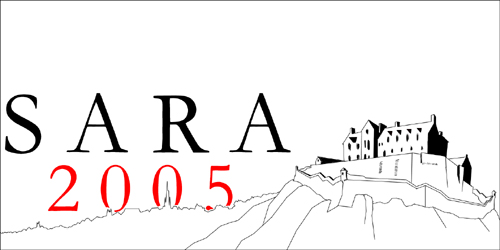
SARA'2005 is an Artificial Intelligence symposium on all aspects of abstraction, reformulation, and approximation. Like past SARAs, it will consist of stimulating technical presentations spanning the traditional boundaries that fragment Artificial Intelligence research.
Attendance is limited to approximately 50 participants. Graduate students whose research involves techniques of abstraction, reformulation or approximation are highly encouraged to attend, and some funding might be available to subsidize their costs.
SARA'2005 will take place from July 26th to July 29th, prior to IJCAI-2005. SARA will be located in a wonderful location: Radisson SAS Airth Castle & Hotel, in Stirlingshire, nearby Edinburgh (Scotland's capital city, one of the greenest and architecturally most beautiful cities in Northern Europe).
It has been recognized since the inception of Artificial Intelligence that abstractions, problem reformulations and approximations (AR&A) are central to human common-sense reasoning and problem solving and to the ability of systems to reason effectively in complex domains. AR&A techniques have been used in a variety of problem-solving settings, including automatic programming, constraint satisfaction, design, diagnosis, machine learning, planning, reasoning, scheduling and theorem proving. The primary use of AR&A techniques in such settings has been to overcome computational intractability by decreasing the combinatorial costs associated with searching large spaces. In addition, AR&A techniques are also useful for knowledge acquisition and explanation generation in complex domains.
The considerable interest in AR&A techniques has led to a series of successful symposia over the last decade. AAAI workshops in 1990 and 1992 focused on selecting, constructing and using abstractions and approximations, while a series of workshops in 1988, 1990, and 1992 focused on problem reformulations. The two workshop series were then combined since there was considerable overlap in their attendees and topics. The present symposium is the sixth in this new series, following successful symposia in 1994, 1995, 1998, 2000 and 2002. Its aim is to provide a forum for intensive interaction among researchers in all areas of artificial intelligence with an interest in the different aspects of AR&A techniques. The diverse backgrounds of participants of previous symposia has lead to a rich and lively exchange of ideas, allowed the comparison of goals, techniques and paradigms, and helped identify important research issues and engineering hurdles. We expect that the upcoming symposium will include an equally diverse group of participants.

Because of the limited capacity of the meeting venue, attendance will be by invitation only. However, it is the aim of SARA to encourage as many people as possible to attend, and therefore invitations will be extended to anyone doing relevant work and, while space permits, to anyone interested in the topic.
Anyone who has a paper or extended abstract accepted (see below) will be invited to attend. Anyone else who is interested in attending must apply by sending a research summary (one or two pages), including a list of relevant publications, to the program co-chairs before April 17, 2005. Invitations will be extended to as many interested people as possible. The research summaries of the invited non-presenters will be published in the proceedings.
Invitations will be sent April 24 2005 along with registration information.
Submissions are requested about all aspects of abstraction, reformulation and approximation (AR&A), including (but not limited to) the following topics:
Researchers who wish to make presentations at the symposium should submit a full paper or, if they prefer, an extended abstract. Authors of accepted extended abstracts are encouraged to produce full papers by the deadline for camera-ready copies. Researchers who wish to attend the symposium without making a presentation must submit a research summary as described above.
Accepted full papers, extended abstracts and research summaries will be published in the Lecture Notes in Artificial Intelligence series by Springer Verlag ![]()
The submissions and final versions of all papers and summaries must be in LNCS/LNAI format. Formatting instructions can be found at www.springer.de/comp/lncs/authors.html. Full papers should not exceed 15 pages, extended abstracts should not exceed 8 pages, and research summaries should not exceed 2 pages.
Full paper submissions must report on substantial, original, and previously unpublished research. SARA allows researchers to submit 1- or 2-page abstracts on research that will be submitted to, has been submitted to, or has already been published in archival conferences or journals. However, researchers are encouraged to submit full papers, if possible.
Papers have to be submitted electronically in PDF format to the following email address:
Please include several ways of contacting the principal author, including e-mail address, telephone number, and fax number. Accepted full papers need to be presented at the symposium. In case of multiple authors, please indicate which authors will participate in the symposium.
Additional information may be obtained from the symposium home page on the World Wide Web:
 IMPORTANT DATES
IMPORTANT DATESText version of the CFP as sent to mailing lists: CFPtext
This page maintained by Jean-Daniel Zucker